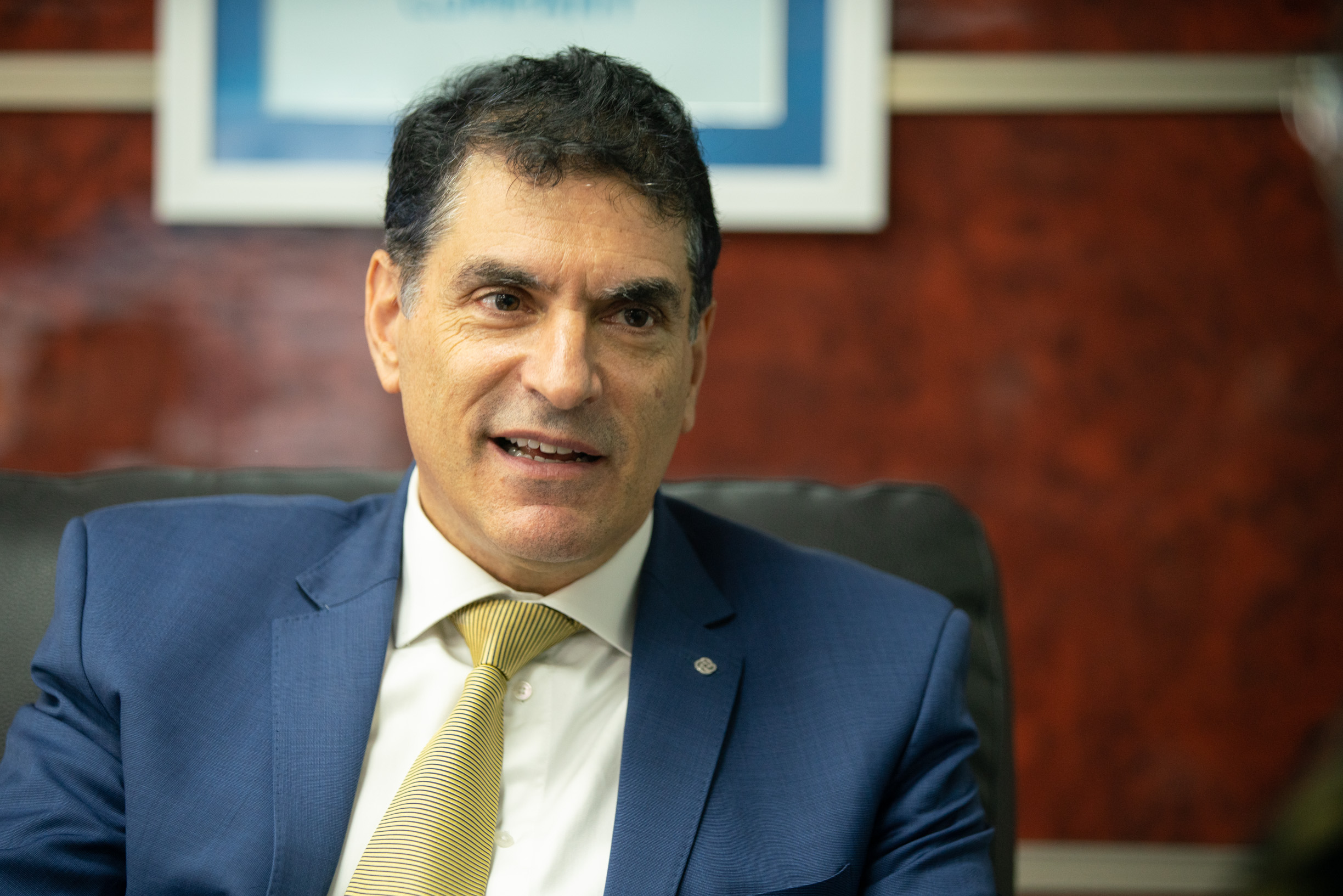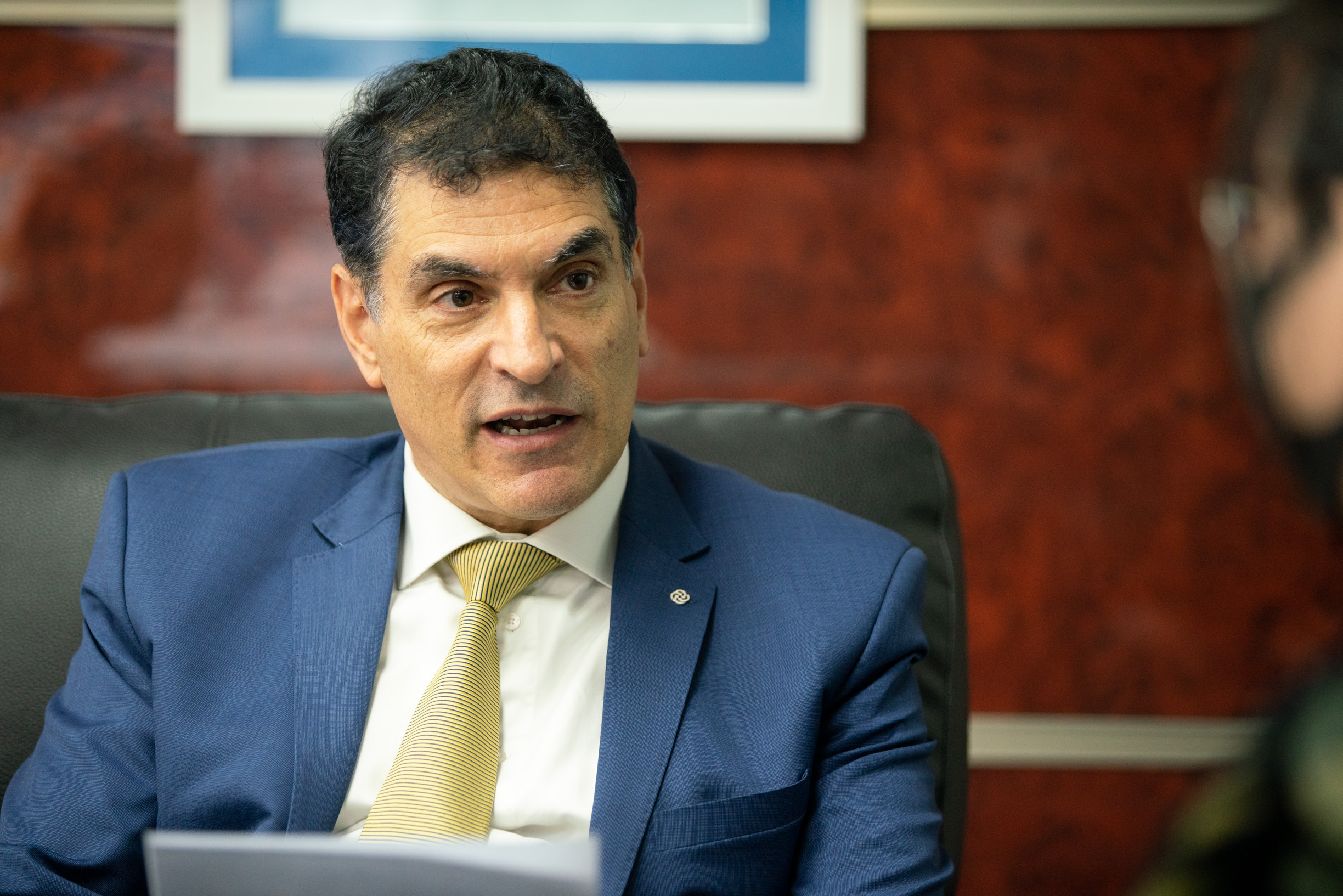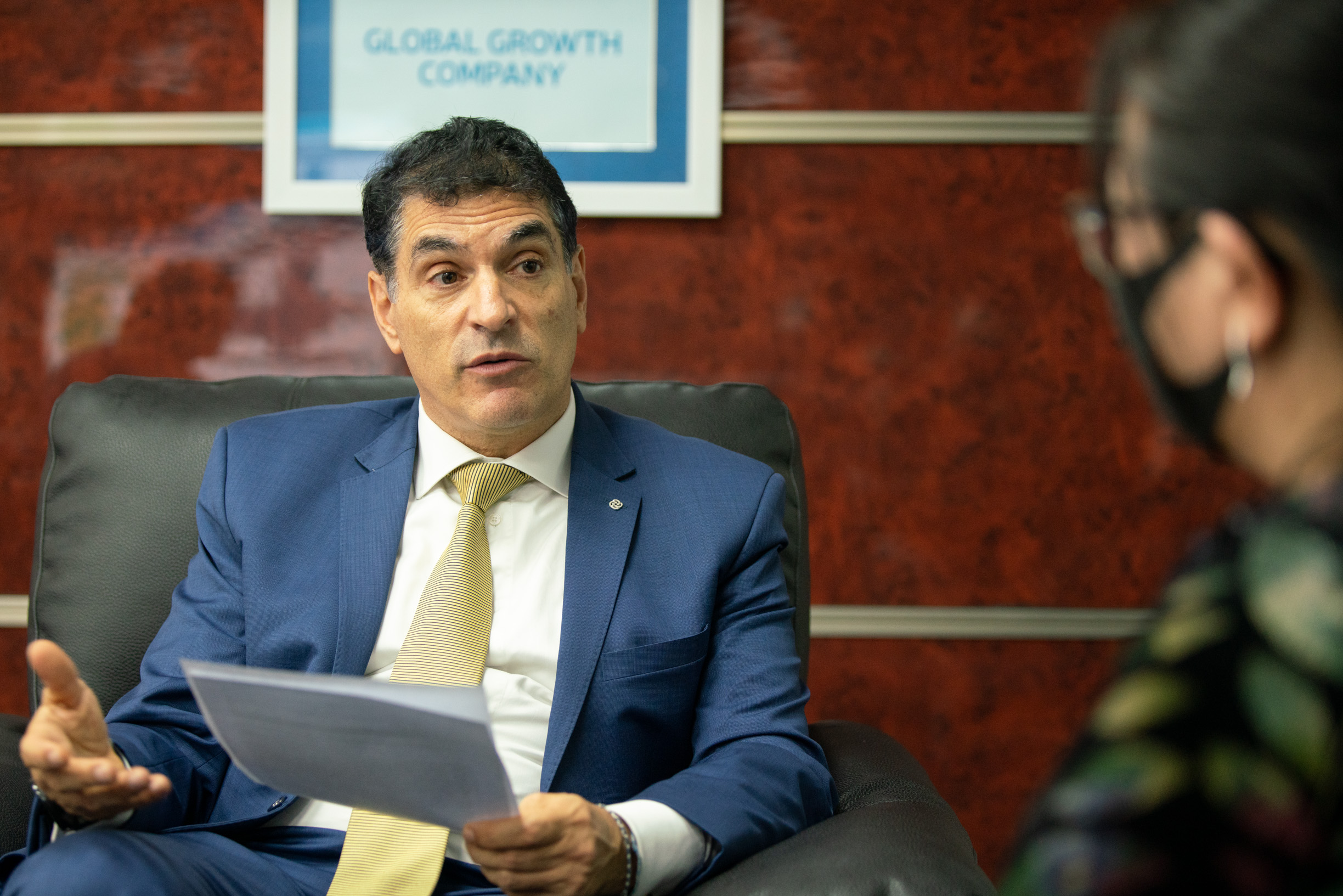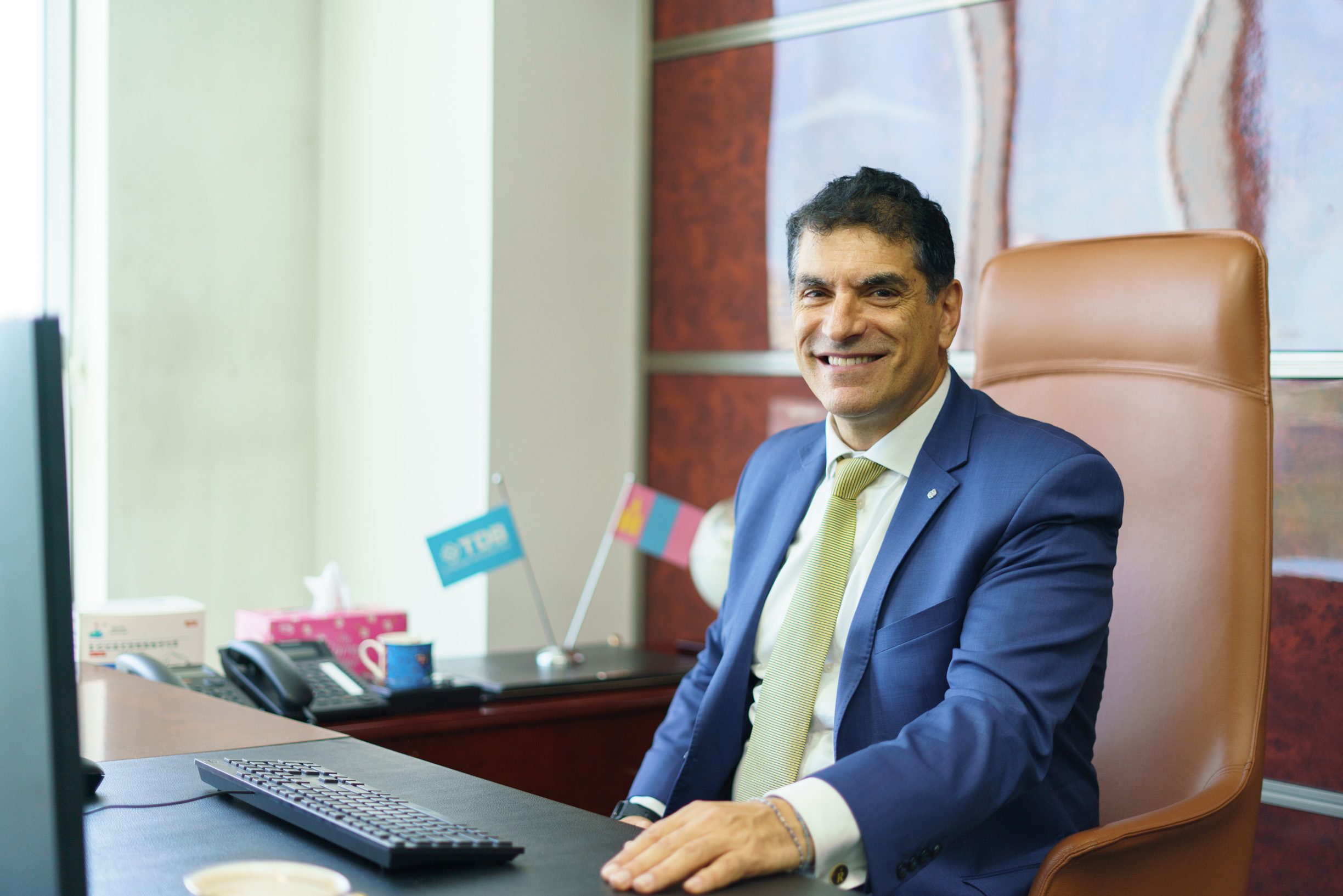
Globally, we are going through an uneasy period of time due to the Covid-19 pandemic, export, logistic issues, geopolitical crisis etc. As an expert with more than 30 years’ experience, please share with us your opinion of the situation.
Warm greetings to your readers! Yes. Covid-19 has been changing the world dramatically. As you have mentioned, the world is facing many small and big problems including health, education, economy, export, import, geopolitics. But there is always opportunities lie behind problems and challenges, even small opportunities. I would like to take more optimistic view.
Please discuss about management policies TDB is implementing amidst the ongoing pandemic
TDB has been taking flexible measures tailored to our customers’ needs, we strived to overcome challenges together with our customers. In order to support our customers, we actively participated in programs and activities by the Government and central bank dedicated to mitigate and reduce negative impacts of the pandemic on the economy, to support businesses, and to recover the economy as well as to create jobs. For example, TDV extended loans with amount of MNT 76 billion to our customers who operate in wool, cashmere, farming, meat, flour, leather sectors under the “Agriculture Support Loans” a 10 trillion MNT program. As such we have been and will continue to support the New Revival policy of the Government of Mongolia.
Also we accelerated digital transformation in order to enable our customers easier access to products and services. As a result, we managed to deliver our banking services and resolve almost all issues digitally during the lockdowns, caused by the pandemic.
But, I have to mention that digital transformation did not happen entirely because of the pandemic. Pandemic pushed us to accelerate and improve the then already ongoing transformation. We continue to work towards delivering all possible banking products and services through digital banking. Another example from 2021, were corporate loans with amount of MNT29.1 billion, which were extended based on customers’ request submitted via TDB’s online service. These kinds of digital banking solutions provide customers an opportunity to self-serve and save time.
You just mentioned that TDB will provide whole range of banking services through digital means. Can you please elaborate.
TDB has three main strategic objectives in the medium term, which are to become an international bank, to become a platform bank and to become a customer-centric bank. Banks and financial institutions that fail to implement digital transformation well, will be left behind. Times are changing and the world is too. What smart device did you have, when you were five years old? Now, five years olds use smart devices better than us! They will define our future and can you imagine banking services without access via digital channels and smart devices? Obviously, this transformation will not happen overnight. Step by step, we will move forward and continually improve. In 2021, 96.7% of all transactions of TDB executed has been performed by online channels (including cards). Going forward the acceleration toward digital will not be limited to transactions. We are working to make possible that the fullest range possible of banking services may be accessed and delivered online. This is how we will become a DIGITAL BANK.

Confidentiality and security of personal information has become an important issue lately. Especially for the banking industry, I assume security of customers’ personal information is crucial. What policies TDB pursue regarding security of digital banking.
We follow international standards in our information security. Personally I had a leadership role in introducing a pioneer internet banking service newly to the market in 1995 in Australia. At the time, that bank was just the seventh in the world to launch online banking and the first in Asia-Pacific. Due to trade restrictions at that time we could not access US encryption typically native to web browsers so the team sourced an equally powerful form of security solution from Ascom (Switzerland). You can appreciate that with such extensive digital banking experience, I am well-practiced in introducing and developing digital banking services with minimum information security risk. Information systems at TDB are monitored 24-hours a day. When you are TDB’s customer, your information will not be found elsewhere. Also as every transaction is thoroughly monitored, unusual, suspicious transactions are subject to enhanced review. Our transaction monitoring and review process uses a number of advanced technologies such as artificial intelligence. Despite the strength of our current protection and monitoring systems, we will continue to make it more advanced, secure and risk-free, through innovation and technological advancement.
When I arrived in Mongolia, I was surprised to see the popularity of smartphones and high internet banking usage. definitely not what I expected. Almost everyone is able to use them possibly because the Mongolian population is quite young. We have a lot of potential. On the other hand, everyone needs to be mindful of information security. There had been 5523 cases of fraud so far, this year and 65% of it occurred online. Everyone needs to exercise caution with their personal information.
You mentioned three main strategic objectives of TDB. Please discuss with us in details of the objective to become an international bank. TDB has public image of an international.
Yes, undisputedly. Since 2007 TDB issued five international bonds and raised funds with an amount of USD 1.14 billion. We used the proceeds to support our customers’ business with financing with concessional terms, and to support the country’s FX reserves, that in turn supports the stability of the national currency and competitiveness of trade. TDB alone handles roughly 40% of Mongolia’s international remittances and trade finance. We have correspondent banking relationship with more than 300 banks and financial institutions, and performing international remittance in 16 currencies. Even during this ongoing period of difficulties, TDB is performing international remittances without any delay.
We also have a representative office in Tokyo, Japan. This number will go up over time. Similar banks in Australia and Vietnam do not just rely on their domestic markets. They also operate in the international market as well. And I am sure we can do it too.
In this globalized world, business is not limited only to the domestic market. Everyone expects that they can do business anywhere, anytime. It just needs some supporting development. As TDB is a reputable, internationally acknowledged bank, we can be the support our customers’ needs. You may have read it, but I would like to repeat what Mr. Gansukh, CEO of MPI Consultants said, as an example:
“… in 2015, project of the new airport with support of the Government of Japan commenced in Mongolia. A tender on “Gas supply system of the new airport” has been announced first time in Mongolia. MPI consultants was the only Mongolian company among the bidders. Although MPI Consultants won and has been awarded the tender in line with tender requirements, it had to start the work without any financing [from the Government]. We requested and TDB issued two guarantees, advance payment guarantee and performance guarantee. Total amount was JPY 250 million or over MNT 6 billion and the construction work of gas supply system at the new airport commenced…”
We have a beautiful new airport now. TDB is a bank that can guarantee such big projects can be accepted internationally.

The concept of “International Bank” seems to be inseparable from a term “Green Bank”. One of TDB’s objectives is to become a green bank. TDB also initiated Climate 30+ Green Recovery Program. Can you please discuss implementation and results of the program?
A very timely question. Thank you! Under our strategic objective to become a green bank, TDB has been accredited by the Green Climate Fund of United Nations. We commenced “Climate 30+” a green recovery program in order to implement Sustainable Development Goals (SDG) and to define and implement objectives to become a green bank. We see a lot potential in green finance to support the economy, not just in domestic market, but also on the international market. Mongolia’s banking sector extended loans worth USD 20 billion. 20.5% the total loans are green loans.
We cooperate with International Investment Bank (IIB) and International Bank of Economic Cooperation (IBEC) to obtain USD funds for supporting sustainable development. In 2021 alone, TDB extended loans with amount of MNT 1.29 billion aligned with SDGs. We also extended green loans with an amount of MNT 29.3 billion to our corporate customers, use of proceeds of which ranges from sustainable water, waste management, recycling, energy saving to reducing and mitigating pollution. We also introduced a new loan product to support women entrepreneurs and extended loans with an amount of MNT6.5 billion.
As an impact of green loans we extended since we introduced business green loans products, CO2 emission is estimated to have reduced by 38.3 million kilograms, a year.
The bank was assessed with “A” grade in ToC implementation assessment jointly conducted by Mongolbank, International Finance Corporation (IFC) and Mongolian Sustainable Finance Association (ToC). The bank was named as the Best ToC Bank of Mongolia in 2021 and Leading Organization of Sustainable Finance in 2022, respectively.
All types of green loans to support green businesses, green products, green consumption etc, have favourable terms of interest and fees. How about other loan products? Banks are often criticized for maintaining the interest rates high for high profit.
Green business loans have concessional terms and green retail loan have better terms than other loans too, and they should be.
About other loan products, first of all, interest rate of loans of commercial banks are set relative to the policy rate by the central bank. Commercial banks’ ability to raise or reduce interest rates on their own is limited. Speaking of the Central bank’s moves, it directly relates to the economic situation of the country. Secondly, interest rate is tied to the cost of funding used to finance such loans. Funding mostly consists of customer deposits, including current accounts and savings of the banks’ customers. However, in order to diversify our funding sources, we obtain funds from international banks and financial institutions and by international bonds etc.
As of the end of 2021, TDB’s corporate loans portfolio amounts to MNT 3.24 trillion and it accounts for 46.4% of the total corporate loans of the banking system. Why do you think, close to 50% of the market prefers finance and expand their business with TDB’s loans? That is because we offer our business loans with lower interest rate, longer term and flexible terms and more pleasant to work with.
How do we manage to keep the loan interest rate lower? Because our domestic and foreign sources of funds are adequate and reliable. All these factors are inter-related like chain-links.
Going forward, we are working to enable these opportunities in the retail market as well. A comprehensive project with multiple steps is currently underway.
You are talking about the retail market. Let us continue this. TDB is perceived to operate in corporate market mostly. It is understood from your discussion that there has been a strategical shift in that policy. Is it right?
Yes. At the same time, we will maintain our leading position in the corporate banking market. Today’s large corporates were small, medium businesses ten, twenty years ago. Therefore, we will stay on the path we have been following thus far, and support small and medium businesses today until they grow up to become the next large, super large corporates.
A parallel frontier for us is retail market. Under our strategy to become a customer-centric bank, we are putting a strong focus to the retail market. Britto Card is the beginning of that. What is the first thing that comes into your mind, when you think about a bank? A card, right? The extremely popular International Britto card, TDB introduced in 2021 is not just another payment card. It is the first card in Mongolia to feature works of world renowned Brazilian artist Romero Britto, under an official license. “Happy Art” genre, in which Romero Britto creates his works inspires happiness, energy and optimism. It can brighten the society.
Also, TDB’s “Mongolians with Savings” campaign with aim to support and incentivize people’s habit to save has been implemented for the last two years. Under the campaign, some customers win prizes every month. One way to measure financial literacy of people of a country is by the percentage of population with savings. In some good news, that one customer of TDB has been awarded with a one-bedroom apartment for being able to save consistently, right before the Naadam holiday. Isn’t it nice to win an apartment just before the biggest National holiday?! Just like that, many other campaigns, initiatives will follow. The bank is adopting Temenos system, which is used by more than 100 large banks globally. The project will continue for one year to improve the bank’s infrastructure.
Last month, Ulaanbaatar city’s inflation was reported to be 16.2%, or rose by 1.4% from previous month. Is TDB experiencing inflation pressure in its operations? How will TDB manage risks?
Yes, we are facing inflation pressures, but many other countries, USA, Australia, Finland and EU are also facing it, not just Mongolia. We had high inflation in 1980s too. People can overcome such difficulties. I am sure eventually we can overcome it, this time around, too. It seems that Mongolian people have outstanding endurance in this regard.
For the bank, we are taking certain measures such as reducing liquidity risk and closely monitoring our loan portfolio. We also are focusing on providing financial advisory to support our corporate, SME, retail customers. People, on their personal finance, needs to limit their spending, control their personal budget and should focus on maintaining value of the family’s assets. For Mongolia, we have an inflation that is not caused by domestic factors, however is imported. Mongolia and Australia are the same, in terms of their mineral deposits. Australia, for example, manages to limit its inflation to a certain extent by exporting its rich resources of lithium, copper, coal and gas to China, Europe and other markets. Therefore, it is lucky. Mongolia has the same potential too.
Economists suggest that Mongolian banks’ profitability is lower than that of their international peers. Can you please let us know your view on this?
A very good question. Right before this interview, I was talking about this topic with some people. Your observation is very accurate. Typical of banks from developing markets, Mongolian banks’ profit closely compares, however in comparison banks return on assets and return on equity are higher in developed countries.
In Mongolia, competition is severe. There are many banks relative to its small population, let alone non-bank financial institutions. In my opinion the competition is healthy. Banks do not simply sit there, making profits off interest spreads. Loan interest is dependent on deposit yields too. We have to pay interests to attract our deposit holders. This would be the largest portion of the bank’s expenses and then there comes non-performing loans. Compared to other countries, for example compared to Australia, non-performing loans ratio is quite high in Mongolia. Borrowers need to choose right loan products that fit to their needs and should be conscious of potential risk that loan interest becomes a burden to their finances.

Top-five banks of the country are working to become public companies to reduce their concentration in their shareholding. How is this work progressing for TDB? have you submitted your request to Financial Regulatory Committee and other relevant authorities?
Previously commercial banks had to do IPO by June 30 to become public companies. However, the Parliament extended the deadline. I believe they see that it would be difficult for all the banks to go to the market same time to raise capital. Risk of failure is high. By extending the deadline, all the banks can successfully do their IPOs. And it could bring more value to the shareholders, too.
For TDB, we were ready for an IPO and all the preparatory works had been completed. But we believe extending the deadline was a wise decision. Because domestic and international stock markets have been very volatile. It is better to go for an IPO after we see some stability for a certain period of time. All Australian banks did become public over the years. Australia has many large mining companies such as Rio Tinto, BHP, and in spite of that, banks account for about 10-20% of the stock market value, and this is healthy. Banks have more stable operations and high returns, thus people prefer to invest in banks. Investors also could participate in bank investment through their pension funds. First things first, we will do our IPO to become a public company and I am confident that we will continue to introduce best international practices.
How difficult is it to operate in Mongolian Banking sector? Does the legal environment provide adequate regulation?
It has been two months since I came here therefore I do not have in-depth knowledge of Mongolian legal environment. However, compared to countries like Australia and Singapore, the Mongolian legal environment seems to provide all important regulations such as customer protection, anti-money laundering and terrorism financing, and ones that mitigate risks. Some openness and innovation have been observed as well. This is an advantage. Not just banks, but also NBFIs, fin-techs offer a wide range of products and services to customers.
However, the Interbank market, that allows banks to lend and borrow funds to from one another, is underdeveloped. Laws and regulations are in place, however there seems to be not much activity. I see there is a great potential for this market to develop in the future, if not today.
It has a few years since adoption of a practice to have their financial statements audited by renowned independent auditors in Mongolia’s banking sector. Which firm audits TDB’s financials?
We have our financial statements audited by Ernst & Young (EY) one of the big four accounting firms in the world. Customers can rely on financial statement audited by any of Big four firms. Our 2021 financial statements are on our web page. You may visit our web to see it.
Thank you for your time. I am TDB’s customer as well, who actively uses my Britto card. It is very nice to meet the President of the bank I am a customer to. I wish you great success on your professional endeavors. How about us to schedule our next meeting in October? In three months, your knowledge about Mongolia will certainly improve a lot.
Thank you! I am very happy to know you are our customer. Good luck to you too. Thank you for the invitation of next interview, I will be very happy talk with you again later.
Please refer to the following link for the Mongolian interview: https://news.mn/r/2570488/